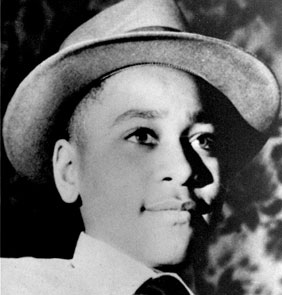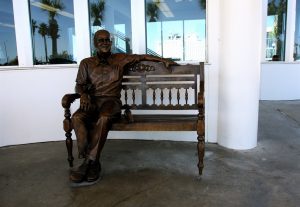Imagine sending your son to visit relatives, thinking you would see him again in a few weeks, only to learn two weeks later that he was murdered. Emmett Louis Till was born in Chicago, Illinois on July 25, 1941 to working class parents.1 His parents, both from the south, met in Argo, Illinois.2 Emmett sadly grew up without his father, after the Army executed him for raping two women and murdering a third in Italy. To add to this already hard life, Emmett got polio at a young age. Although he survived, he was left with a stutter. At school he was known as risk-taker, and he was also described as very outgoing. During the summer of 1955, Emmett’s mother sent him when he was only fourteen years old to Mississippi to visit some relatives, not knowing that she would never see her son alive again.3
Life in the south was much different than life was like where Emmett was from. He did not act the same way his cousins did around white storeowners. He talked freely about his girlfriend back home who was a white woman. One night, after a week in Mississippi, Emmett and seven other teenagers drove to a nearby town to hang out. While they were there, they went to the local grocery store owned by a white couple, Roy and Carolyn Bryant. Roy Bryant was away on a trip, and Carolyn was left in charge of the store. Several accounts exist of the events that happened next, but what is thought to have happened is the boys dared Emmett to go inside the store and ask Carolyn Bryant on a date. It is said that he went inside, bought a pack of gum, then grabbed her hand and asked her on a date. Immediately after this, she pulled away and ran into the back of the store to get a gun. During the time where she went into the back, Emmett’s cousins, realizing what had just happened, ran into the store and pulled Emmett out. As the teenagers were leaving, Emmett allegedly whistled at her and possibly even said, “bye baby!”4

After returning from his trip and finding out what had happened, Roy Bryant and his half-brother J.W. Milam went out to seek revenge. They arrived at the house of Moses Wright, Emmett’s uncle, late Saturday night, both armed with pistols. They stormed the house, ripped Emmett out from his bed, and drove off with him. His uncle pled with them, explaining Emmett was from the north and didn’t know any better, but the men refused to listen. They drove to Milam’s home where they tortured Emmett and mutilated his body. Then they took him to the Tallahatchie River where they forced him to take off all his clothes, shot him, then tied a metal fan to his body and rolled it into the river. Wright reported the kidnapping to the local sheriff the next morning, and by noon, police arrested the two men. They confessed to kidnapping him but claimed that they had let him go. Three days later, fishermen found Emmett’s body floating in the river.5
Mamie Till insisted on having Emmett’s body returned to Chicago so that she could have a funeral for him. She had an open-casket funeral so that everyone would see what had been done to her son. News of this spread immediately and caused an outbreak of protests. In Harlem, an estimated 20,000 people rallied to demand that Congress pass an anti-lynching bill.6
The trial of Roy Bryant and J.W. Milam began on September 19, 1955. Because African-Americans, and women were not allowed to serve as jurors in Mississippi, the jury was all white and all male. After four days of testimony, the jury acquitted Bryant and Milam of all charges. The two later confessed to the murder in an interview, but because of double jeopardy they were not able to be prosecuted.7
Following the news of the trial, thousands of outraged people spoke out. People began to realize that even after Brown v. Board of Education, there was still so much more that needed to be done. Citizens sent letters to their congressmen and the White House, newspapers editorials bashed the jury’s decision, and the number of people in the NAACP expanded greatly. Mamie Till spoke out on multiple occasions about the injustice that her son received. She told people to remember what happened to him and to continue fighting for justice. In addition, popular artists at the time including Gwendolyn Brooks, Toni Morrison, James Baldwin, and Bob Dylan used their own talents to create works dedicated to the Emmett and his case.8
In 2004, the FBI reopened the case. This investigation lasted three years, and during it they exhumed Till’s body to do a complete autopsy. The autopsy did not lead to any criminal charges, but it did lead to Milam’s brother confessing on his deathbed about his own involvement in the kidnapping. Till’s body was put in a new casket and his old casket was later donated to the Smithsonian’s National Museum of African American History and Culture.9
In 2008, a bill was signed into law called the Emmett Till Unsolved Civil Rights Crime Act, which provided funding to “reinvestigate crimes against civil rights workers and their allies.”10 Till’s name continues to remain in our nation’s memory, specifically through the statue of him and Dr. Martin Luther King, Jr. in Denver’s City Park, and in the Emmett Till Players that his mother formed in Chicago. Even today, his case is still being looked at. It was reopened in 2018 due to the publication of a book containing a confession from Carolyn Bryant that states she lied in her testimony during the trial.11 Even though the men who did this to Emmett Till got away with it, the nation is still fighting to get him the justice he deserves. No matter how long ago something occurred, it is never too late to seek justice.
- Encyclopedia Britannica, 2018, s.v. “Emmett Till,” by Michael Ray. ↵
- Simeon Wright and Herb Boyd, Simeon’s Story: An Eyewitness Account of the Kidnapping of Emmett Till (Chicago: Chicago Review Press, 2010), 14. ↵
- James J. Podesta, “Till, Emmett 1941-1955,” Contemporary Black Biography 7 (1994): 262-266. ↵
- James J. Podesta, “Till, Emmett 1941-1955,” Contemporary Black Biography 7 (1994): 262-266. ↵
- James J. Podesta, “Till, Emmett 1941-1955,” Contemporary Black Biography 7 (1994): 262-266. ↵
- James J. Podesta, “Till, Emmett 1941-1955,” Contemporary Black Biography 7 (1994): 262-266. ↵
- Encyclopedia Britannica, 2018, s.v. “Emmett Till,” by Michael Ray. ↵
- Salem Press Biological Encyclopedia, 2014, s.v. “Emmett Till,” by Catherine R Squires. ↵
- Encyclopedia Britannica, 2018, s.v. “Emmett Till,” by Michael Ray. ↵
- Salem Press Biological Encyclopedia, 2014, s.v. “Emmett Till,” by Catherine R Squires. ↵
- Salem Press Biological Encyclopedia, 2014, s.v. “Emmett Till,” by Catherine R Squires. ↵



49 comments
Daniela Martinez
The story of Emmet Till is one that regardless of how many times I read it continuously to break my heart. It is truly heartbreaking to even think about how someone could do something so horrible to an innocent child and then admit to it years later. The amount of pain and suffering that this event caused could never be reversed.
Hailey Stewart
The story of Emmett Till always brings to the verge of tears. I am glad that Mamie Till never stopped fighting for the justice of her son. She strikes me as such a strong woman, especially having the open casket at his funeral. No parent deserves to outlive their child, and on the same note, no one deserves to be murdered over petty encounters. This article was well organized and well written, giving this story a balanced recounting.
Kathyleen Lauriano
I never heard the whole story about Emmett Till. This article really informed me about Emmett’s death and the cause. No mother should have to go through what Emmett Till’s mother did. Its truly a tragic death. Emmet’s mother was very strong and fought to get justice for her son. For her to have an open casket funeral shows her strength and determination for justice to be served. I wonder how this case will be solved now with all this new information.
John Smith
What those men did to Emmet Till is disgusting, it’s no wonder that civil rights in America has such a deep and rocky history when men and women like the ones who killed Till existed (and probably still do). It’s a shame that a boy had to die to promote changes that civil America desperately needed, sadly it’s far too rare for great change to happen without bloodshed. We can only hope that all the bloodshed was worth it and that those who passed will be remembered.
Caden Floyd
I have never heard of Emmett Till before, but I feel like everyone should hear his story after reading this article. It is sad to imagine a man not getting the justice that he fought for and deserved just because of a bunch of white prejudice men. What made me even more sad is the fact that he was murdered by two men who got away with it due to their skin color as well. Although Emmett didn’t get what he deserved, his name is stamped on history for eternity.
Bictor Martinez
It is unfortunate of what Emmett grew up into. Having to be treated differently just because of one’s race is terrible. The kids Emmett grew up are extremely rude. Having him ask out a white girl just to see her pull out a gun because of Emmett’s race for their own satisfaction is unbearable. It is unfortunate he did not get the justice he deserved at the time however, this case continues to seek justice for others and for the future of others thanks to Emmett.
Tyanne Pearcy
It is crazy to think how different things were back then in the north and the south. Emmet Till was just being himself without thinking of the color of his skin and got punished for it. This incident definitely sparked something in the civil rights movement. It is upsetting that the men that did this to Emmet got off free and that Carolyn Bryant just recently confessed to lying. Even though this case was awhile ago people still want justice for such a tragic unfair event.
Adam Portillo
The story of Emmett Till was very chilling for me. It’s very sad and hard to comprehend why people would so this to a young kid. Emmett Till was just a young boy with no knowledge of how things worked in the deep south. Truly I believe Emmett Till is a hero and a symbol for the civil rights movement. I feel that his death really fueled the movement along with other things. It’s terrible that during the trial the killers were acquitted then confessed to the murders and couldn’t be charged again. For me this proves that during this time our trial system was indeed flawed.
Jennifer Salas
Throughout this whole article I kept thinking about Emmett Till’s mother, and how she must have felt through this whole chaos. She was really a strong women and continued to seek justice for her son, and even made his funeral an open casket to let others see what they did to him I can’t believe that after so many years Carolyn Bryant confessed that she lied. I wonder how this case will be solved and what’s going to happen to her now.
Alexandra Rodriguez
The story of Emmett Till’s death, and the reason for his death is heartbreaking. I was unaware of Till’s story until now, which is astounding because it is a big piece of African-American history in the Americas. It was very well written, and the style made me want to read more. Definitely glad I read this piece, especially since it is such a large part of the equal rights movement.